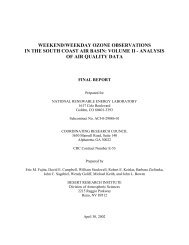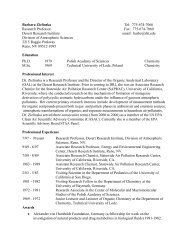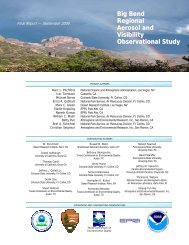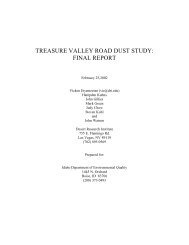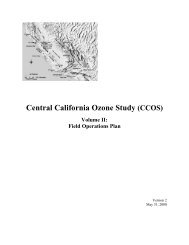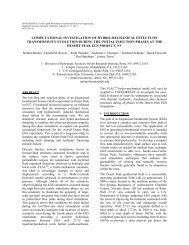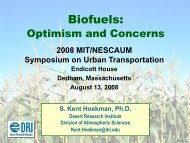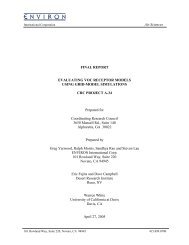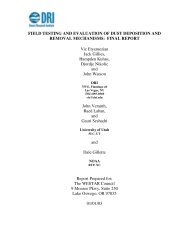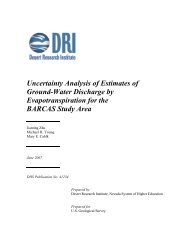Assessment of Conversion Technologies for Bioalcohol Fuel ...
Assessment of Conversion Technologies for Bioalcohol Fuel ...
Assessment of Conversion Technologies for Bioalcohol Fuel ...
Create successful ePaper yourself
Turn your PDF publications into a flip-book with our unique Google optimized e-Paper software.
with regards to siting and permitting could streamline the demonstration and<br />
deployment <strong>of</strong> these technologies. Governments can also assist on the market side<br />
through policies and regulations that assure adequate markets <strong>for</strong> bioalcohols and coproducts<br />
and adequate returns on investments in production facilities.<br />
The recently funded DOE projects are intended to produce several demonstration<br />
projects by at least 2012. Other technology companies are planning to build<br />
commercial scale plants by this time. These expectations appear to be realistic<br />
assuming that the level <strong>of</strong> interest and funding continues to increase substantially.<br />
Among the 38 active technology developers pr<strong>of</strong>iled in this study are a number <strong>of</strong><br />
promising candidates <strong>for</strong> potential commercial deployment. Included are both<br />
thermochemical and biochemical process approaches representing fundamentally<br />
different technology paths. Both approaches require and warrant further development<br />
emphasis and funding support, although most emphasis to date has been on the<br />
biochemical path. Thermochemical technology is the more emerging path, but<br />
appears to have certain advantages that suggest it deserves at least equal<br />
development attention.<br />
Thermochemical processes have the ability to convert virtually any biomass feedstock<br />
to bioalcohols or other bi<strong>of</strong>uels, a particularly important feature <strong>for</strong> Cali<strong>for</strong>nia and other<br />
regions with a wide variety <strong>of</strong> biomass feedstock sources <strong>of</strong> different compositions and<br />
qualities. The energy efficiencies and environmental characteristics <strong>of</strong> facilities<br />
employing thermochemical technologies appear attractive as well. Also, the<br />
thermochemical processes require much less biomass <strong>for</strong> economic viability, making<br />
them better suited <strong>for</strong> the distributed production <strong>of</strong> bioalcohols and electricity.<br />
The thermochemical technology with the highest probability <strong>for</strong> success is an<br />
integrated pyrolysis/steam re<strong>for</strong>ming process. Current analysis suggests that a<br />
commercial plant utilizing this technology should be able to produce mixed alcohols at<br />
a cost <strong>of</strong> about $1.15/gallon <strong>for</strong> a 500 BDT/day plant, which would make this process<br />
competitive with traditional corn-based ethanol production. If market constraints to the<br />
use <strong>of</strong> mixed alcohols as transportation fuels prevail, then the further refinement <strong>of</strong><br />
mixed alcohols to ethanol would add nominally to this production cost.<br />
The biochemical conversion processes encompass two primary approaches–acid<br />
hydrolysis/fermentation and enzymatic hydrolysis/fermentation. Biochemical<br />
conversion processes that utilize enzymatic hydrolysis <strong>of</strong> lignocellulose, followed by<br />
fermentation <strong>of</strong> the simple sugars are currently estimated to have an ethanol<br />
production cost <strong>of</strong> approximately $2.24/gallon <strong>for</strong> a 2,205 BDT/day plant. Projected<br />
improvements in biochemical conversion processes have the potential <strong>of</strong> reducing<br />
ethanol production costs below $1.50/gallon <strong>for</strong> 2,205 BDT/day or larger plants by<br />
2012.<br />
Larger biochemical conversion plants can become viable when significant quantities<br />
(>2,000 tons/day) <strong>of</strong> biomass are available at feedstock costs below $35/BDT. An<br />
56



